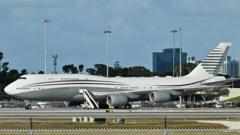The recent transfer of an aircraft from Qatar adds to political debates surrounding foreign gifts, stirring controversy and concern from various factions.
**Controversial Qatari Gift Becomes New Air Force One Contender**

**Controversial Qatari Gift Becomes New Air Force One Contender**
Amidst intense scrutiny, the US accepts a $400 million Boeing 747 from Qatar for Air Force One modifications.
In an unprecedented move, the US has officially accepted a Boeing 747 from Qatar, intended for integration into the historic Air Force One fleet. This aircraft, valued at approximately $400 million, was announced as a gift from the Qatari royal family. Despite assurances from the Pentagon regarding the legality of the transfer, the decision has ignited fierce debate and criticism, even among staunch supporters of President Trump.
Chief Pentagon spokesman Sean Parnell confirmed the acceptance of the aircraft, emphasizing compliance with federal regulations. The Boeing 747 will undergo extensive modifications to meet the high-security requirements necessary for transporting the president, including advanced technology to counter nuclear threats and mid-flight refueling capabilities. Experts have projected that these retrofitting efforts could incur costs that potentially soar to $1 billion.
In defense of the transaction, President Trump argued against criticism, describing the aircraft transfer as a straightforward gift that should not be rejected. The White House maintains that the plane will eventually be donated to Trump's presidential library post-term, which raises further questions about the implications of foreign gifts under the Emoluments Clause of the US Constitution. Critics in Congress have highlighted the lack of congressional approval for the transfer and have expressed concerns about ethical implications and potential influences on US foreign policy.
The current Air Force One fleet includes aging 747-200 models, which have served since 1990, alongside smaller aircraft. As the Trump administration navigates this contentious acquisition, questions regarding the national security ramifications of accepting such gifts loom large. Critics from both parties have voiced worries about the potential for foreign influence, citing historical sensitivities surrounding Qatari relations. Senator Rand Paul stated concerns about the trade-off between military aid and human rights assessments, while Senator Ted Cruz warned of espionage risks involved with accepting the plane.
In stark contrast to the voices of dissent, Qatari officials, including Prime Minister Sheikh Mohammed bin Abdulrahman bin Jassim Al-Thani, insisted that the deal is strictly a government-to-government arrangement, devoid of personal implications or favoritism. Despite these reassurances, skepticism remains prevalent regarding the broader impact of the gift on diplomatic relations and national security assessments.
As the US embarks on this new chapter for Air Force One, the ramifications of the Qatari aircraft deal persistently challenge both political boundaries and ethical considerations in international diplomacy.
Chief Pentagon spokesman Sean Parnell confirmed the acceptance of the aircraft, emphasizing compliance with federal regulations. The Boeing 747 will undergo extensive modifications to meet the high-security requirements necessary for transporting the president, including advanced technology to counter nuclear threats and mid-flight refueling capabilities. Experts have projected that these retrofitting efforts could incur costs that potentially soar to $1 billion.
In defense of the transaction, President Trump argued against criticism, describing the aircraft transfer as a straightforward gift that should not be rejected. The White House maintains that the plane will eventually be donated to Trump's presidential library post-term, which raises further questions about the implications of foreign gifts under the Emoluments Clause of the US Constitution. Critics in Congress have highlighted the lack of congressional approval for the transfer and have expressed concerns about ethical implications and potential influences on US foreign policy.
The current Air Force One fleet includes aging 747-200 models, which have served since 1990, alongside smaller aircraft. As the Trump administration navigates this contentious acquisition, questions regarding the national security ramifications of accepting such gifts loom large. Critics from both parties have voiced worries about the potential for foreign influence, citing historical sensitivities surrounding Qatari relations. Senator Rand Paul stated concerns about the trade-off between military aid and human rights assessments, while Senator Ted Cruz warned of espionage risks involved with accepting the plane.
In stark contrast to the voices of dissent, Qatari officials, including Prime Minister Sheikh Mohammed bin Abdulrahman bin Jassim Al-Thani, insisted that the deal is strictly a government-to-government arrangement, devoid of personal implications or favoritism. Despite these reassurances, skepticism remains prevalent regarding the broader impact of the gift on diplomatic relations and national security assessments.
As the US embarks on this new chapter for Air Force One, the ramifications of the Qatari aircraft deal persistently challenge both political boundaries and ethical considerations in international diplomacy.




















